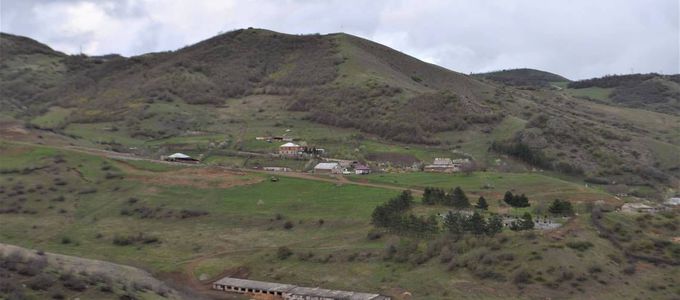
For years there has been a conflict in the region, with armed hostilities flaring up periodically. Despite a cease-fire agreement, there is no end to the turmoil engulfing Armenia, Azerbaijan, and the embattled region of Nagorno-Karabakh.
Despite all of its beauty and its impressive history, Armenia has come to stand for poverty, foreign rule, and economic crises. Eighty per cent of the inhabitants of this country between Asia and Europe eke out a scanty livelihood and live below the poverty line. It affects the poorest: the children, the young generation.
Despite the political uncertainties, NAK-karitativ is continuing to provide aid shipments. For four years now, the German aid organisation of the New Apostolic Church together with the German-Armenian Friendship Association has been supporting small-scale projects to help people generate income in the border region of Tavush in the north-east of the country. A large proportion of the people there are unemployed. While young people leave the region and the men are in Russia looking for work, the women fight for the family’s survival at home.
Boosting income
Beekeeping or chicken and goat farming are some of the sponsored projects. Most are successful. Agricultural projects in particular have proven to be very profitable for the people.
One successful project is being run by Mechita, a small farmer from Noyemberyan. He was awarded a small loan and was able to open a firm that specialises in the building of and delivery of wooden boxes. In the meantime, he has become so successful that he has been able to hire seven people. With an hourly wage of approximately two US dollars, the workers earn a good income for Armenian standards.
Gevorg, a goat farmer from Kogb, was able to increase his livestock to 20 animals thanks to being able to take better care of his herd. From the sale of the animals he can now save enough money for his family and animal feed. At the other end of the village lives Mamyan, a beekeeper. As a start, NAK-karitativ gave him eight beehives. Today he sells well over 30 kilograms of honey, making about 4,500 Armenian dram per kilo (about 9 US dollars). The generated income allows him to cover all his expenses over the winter and to save enough money to buy more beehives in the spring.
Other small businesses, such as hairdressing salons, are also receiving funds, which is having a positive effect on the income and living conditions of the people. In addition, the villages of Noyemberyan, Koghb, Berdavan, and Zorakan have been receiving donationsof food, children’s clothing, and school materials for many years.
Fortunately, the people in these villages have not yet been directly affected by the conflict. So far, the projects can be continued.
Nagorno-Karabakh
On 29 September 2020 a state of war was declared between Armenia and Azerbaijan following heavy fighting in the region of Nagorno-Karabakh. The cause is an unresolved ethnic and territorial conflict over the disputed region of Nagorno-Karabakh. The region with its 145,000 inhabitants is controlled by Armenia but belongs to Azerbaijan under international law. After the collapse of the Soviet Union in 1991 a military conflict flared up in Nagorno-Karabakh, which escalated in 1994. An end to the conflict is not in sight.
New Apostolic in Armenia
Rafael Movsesian, who has been caring for the New Apostolic Christians in Armenia as a Bishop since 2001, reports civilian deaths. Both sides are deploying artillery, infantry, aircraft, and drones on a large scale by both sides, he says. Armenia has ordered a general mobilisation for men up to 55 years of age.
In those regions of the country where New Apostolic congregations are located, the situation is quiet for now. “We can celebrate divine services as planned.” At the same time, the Bishops asks for intercession: “On behalf of the faithful in Armenia I thank everyone for their prayers.”
Intercession for the people
District Apostle Rainer Storck is also concerned about the escalation of the conflict. “We are thinking of you and hope that a political solution is possible,” he wrote to the brothers and sisters in both countries and assured them of his prayers. The New Apostolic congregations in Armenia and Azerbaijan are looked after by the District Church Western Germany. In Armenia there are 674 New Apostolic Christians in nine congregations; in Azerbaijan there are 468.
Armenia is traditionally Christian. Some 92 per cent of all Armenians belong to the Armenian Apostolic Church.




